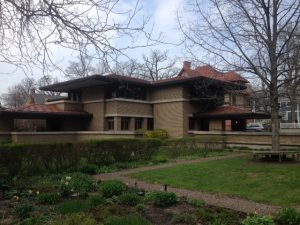This article is more than 5 years old.
Joy and I had the wonderful opportunity to attend the LOEX conference in the beautiful city of Grand Rapids, Michigan with 375 other librarians. This was my second LOEX, and again I am impressed with what a great conference this is and how much it has given me to think about. Some takeaways from the conference include:
Online Course Design
Kyle and I will be working hard this summer designing an online version of LIB 100. I attended Mass Producing a Masterpiece, a presentation put on by USC librarians about their creation of an 80-section/yr online information literacy course. While their circumstances are vastly different from ours, this was probably the most beneficial and practical presentation I attended. Some suggestions/lessons learned included:
- Capping online classes at 15 (check!)
- Using a backwards design process when planning (check and mate!)
- Being realistic about how long it will take to grade and provide feedback to avoid all night grading sessions
- Knowing the capabilities of your technology (Sakai, etc…) going in, as technical difficulties can hamper plans for active learning
- Being realistic about how long content creation will take (much longer than you’d think)
The session also reminded me about Quality Matters, which is sort of a “quality assurance” approach to online courses and is often used at universities heavily invested in online learning. I found a copy of the Quality Matters Rubric, which is a checklist of sorts for creating online courses, to refer to in the future.
I also attended a wonderful session put on by our NCSU colleagues, Anne Burke and Andreas Orphanides, about using card sorting for instructional design. Card sorting is traditionally used by web designers and other user experience professionals to organize online content, but it definitely makes sense to use for backwards design in instruction as well. I’m hoping Kyle and I can utilize this technique for online LIB 100!

New Information Literacy Framework
As some of you may know, ACRL has put together a task force to extensively revise the ACRL Information Literacy Competency Standards adopted in 2000. This revision is in draft phase and is now called the Framework for Information Literacy in Higher Education. Several major changes are underway in this new document. The first change is moving from a “standards” approach to a “framework” approach, which I believe is an effort to make information literacy less prescriptive and more open to adoption in other disciplines. The second change is the introduction of “threshold concepts” as the cornerstone of the new framework. I recommend the article linked above if you’d like to know more about what threshold concepts are, but I liken a threshold concept to a “lightbulb moment,” or when you finally grasp a concept and it changes the way you think about a subject or idea. The threshold concepts currently proposed for information literacy (with possibly more coming) are:
- Scholarship is a Conversation
- Research as Inquiry
- Format as Process
- Authority is Constructed and Contextual
- Searching is Strategic
Some of these ideas are probably familiar (scholarship as conversation, research as inquiry), but some provide a new way of looking at things (authority is constructed and contextual). Unfortunately, there was very limited formal discussion of the new information literacy framework at LOEX, in what I felt was a missed opportunity. Nevertheless, Joy and I attended the one round table discussion on the framework and our dine-around group also had a lively discussion on the topic. My general impression is that most librarians are very interested in the new framework, but perhaps cautious about introducing it to faculty and uncertain about its implications for assessment. To be honest, I’m not sure that the new framework signifies a huge of a departure from what we already do. As instructors, we will still create learning outcomes, assess them, and change and improve each time we teach. What I envision happening is a re-imagining of how teach and assess these ideas — particularly around the concepts of scholarship as conversation, research as inquiry, and format as process.
Anyways, lots of ideas to work with this summer! I could talk about this topic until the cows come home, so I will stop now, but please feel free to talk to me about it in person!
Assessment Ideas
Another beneficial session I attended was onQuick and Easy Learning Assessments in Your Library Classroom. I won’t go into excruciating detail here, because this is getting quite long enough, but the main thing I took away from this session was “any qualitative data can be turned into quantitative data.” Hearing this was like reaching my very own “threshold concept” about assessment and I’ll be looking into ways that this idea could be adapted in my own instruction.

Thoughts on the GR
Grand Rapids was a lovely, vibrant city. Joy and I made sure to leave bright and early Thursday morning so we would have an opportunity to explore before the opening conference reception. We hit the pavement Thursday touring the Frank Lloyd Wright designed Meyer May House, learning some presidential history at the Gerald Ford Museum, appreciating the art at the Grand Rapids Art Museum, and strolling the Grand River on the Grand River Walkway. Check out some of the pictures accompanying ours posts! Great art scene, great beer scene, great food scene — there is lots to love about Grand Rapids and I hope to visit again!

5 Comments on ‘Amanda at LOEX 2014’
It sounds like you had an excellent experience. Thanks for sharing it with us!
Glad you got so much out of the conference and glad you enjoyed Grand Rapids. Never visited it much when I lived in Michigan, but glad to hear to looks good to visitors!
I’m excited for the future of information literacy and e-learning as well!
Thanks for sharing your insights into the future of info lit. Its an exciting time with many possibilities. I’m glad you and Joy and Kyle are at the forefront!
Thanks for informing us on info lit & e-learning. Quality matters. It changes everything.